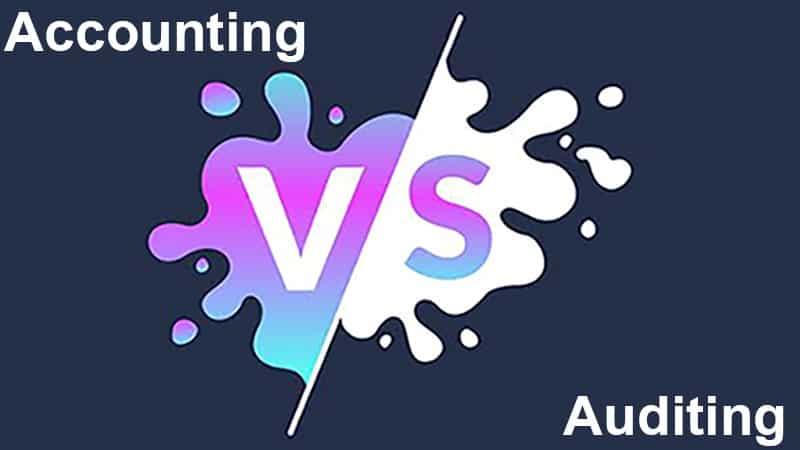
AUDITING VS ACCOUNTING: KNOW THE DIFFERENCE
Accounting and auditing are the two key pillars in the financial sector. Both accounting and auditing are elemental in ensuring the smooth functioning of business firms. Usually, both the terms are somehow similar, but there are some fundamental differences between the two terms in this article both the terms are taken into account to explain these differences.
Accounting involves the preparation of financial statements while tracking all the transactions of the firm. It accommodates the collection of data regarding all such transactions. These transactions include incoming and outgoing funds, records of profits, losses, dividends, equity, assets, and liabilities. Professionals in accounting are required to be well versed in mathematical and analytical skills. There are primarily 8 branches associated with accounting; are financial accounting, cost accounting, fiduciary accounting, managerial accounting, forensic accounting, government accounting, tax accounting, and auditing. If you want to get help with auditing, there are many auditing assignment help experts who are quite knowledgeable and highly skilled.
As it is clear from the above statement that auditing is one of the types of accounting, it primarily focuses on the corroboration of the financial document of a firm. This corroboration involves an examination of financial documents thoroughly. These documents include tax documents, capital accounts, transactions records, etc. So it is basically an assessment of financial records or accounts that are already kept in record. Apart from the fundamental differences, there are some more parameters taken into accounts to distinguish auditing vs. accounting. Given below is a brief comparison between auditing and accounting.
ACCOUNTING VS AUDITING
Auditing and accounting are compared on the basis of academic courses, educational qualifications, skills, job market, and pay scale.
- Courses in accounting and auditing:
Accounting offers a diversity of academic courses. These include chartered accountancy, management accountancy, public accountancy, financial risk management, etc. The most popularly opted course however is that of chartered accounting. Every year thousands of students opt for this course aspiring to become chartered accountants.
Auditing on the other hand can be pursued with a bachelor’s degree in any of the financial sector disciplines. It can also be pursued as an individual component of an undergraduate or postgraduate degree. Someone looking to pursue an MBA can opt for an accounting specialization. Even after the completion of an MBA in accounting or any other related field, and auditing certificate can be obtained.
- Educational qualifications required for accounting and auditing:
For becoming an accountant, a minimum qualification of a bachelor’s in accounting and finance is required. This is the bare minimum one needs to survive in the accounting profession. Moreover, the prevailing competition in the job market requires individuals to pursue the highest possible certificate in accounting and finance. Having a master’s degree, an MBA or even a shorter diploma gives the professionals an edge over others in the competitive job environment, where there is cutthroat competition for even the smallest post.
Auditing jobs require the basic qualification of a bachelor’s in accounting. As mentioned earlier, higher degrees are more preferred in the competitive environment. Taking up a smaller job with a bachelor’s degree and elevating to higher posts can be a good option here. Alternatively higher degrees can also be pursued while serving in the lower segment jobs.
- Job market of accounting and auditing:
Individuals holding professional degrees in accounting and finance have a plethora of job opportunities before them. These jobs include financial advisor, financial planner, financial risk manager, tax accountant, cost accountant, chartered accountant, etc.
Auditing jobs on the other hand are categorized into government auditors, external auditors, forensic auditors, and internal auditors for individual firms. Professional auditors include financial analysts, management analysts, budget analysts, and finance managers. These jobs have the basic component of auditing the established records and producing wellness reports for individuals, firms or government organizations.
- Pay scale of accounting and auditing jobs:
Auditing jobs offer quite satisfactory annual packages to professionals. The salary of a professional auditor ranges from Rs. 1.5 Lac per annum at the beginner level to around 7 to 8 Lac per annum at the experienced level. In the corporate sector, the pay scale depends primarily on the working experience and efficiency in working. As one spends more time in the job they gain valuable knowledge and experience.
Accounting jobs to offer high pay to accounting professionals. On average accounting professionals receive Rs. 1.25 Lac per annum at the beginner stage and around Rs.5 to 6 for experienced professionals. Individuals can similarly benefit from both the job segments owing to the similarity in pay scale.
- Ease of learning:
Accounting and auditing belong to the financial stream both require adept mathematical skills and analyzing capabilities. While accounting requires professionals with more complex mathematical and accounting skills to prepare the accounts records, Auditing is a post mortem activity and is oriented towards corroboration of prepared records. It requires a higher problem-solving aptitude.
FINAL ANALYSIS
Accounting is the best-suited profession for individuals interested in mathematical work and having relevant mathematical and managerial skills since accounting is all about math and statistics. Auditing on the other hand is associated with mild mathematical abilities and a problem-solving attitude. Based on their relevant interest and capabilities individuals can go for either of the two disciplines.
CONCLUSION
After having an overview of accounting vs. Auditing, on the grounds of the above information on various aspects of accounting and finance, it can be figured that both the fields in the financial sector offer great working conditions complemented with relevant pay scales. This viable combination attracts innumerable job aspirants to these sectors.